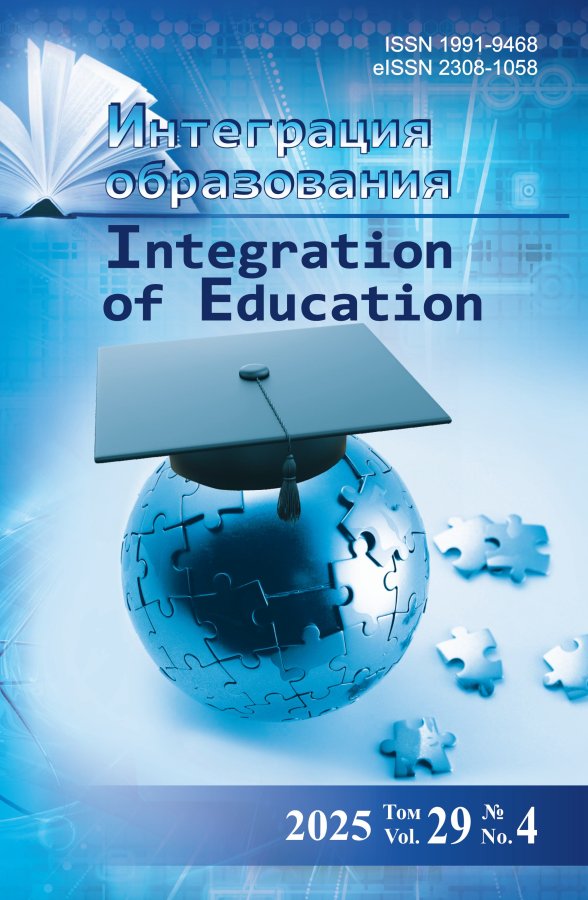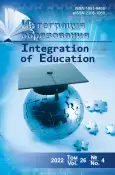Моделирование цифрового имиджа преподавателя вуза
- Авторы: Тимохина Г.С.1, Попова О.И.2, Изакова Н.Б.2
-
Учреждения:
- Российский экономический университет им. Г. В. Плеханова
- Уральский государственный экономический университет
- Выпуск: Том 26, № 4 (2022)
- Страницы: 613-636
- Раздел: Модернизация образования
- Статья получена: 19.05.2025
- Статья одобрена: 19.05.2025
- Статья опубликована: 21.12.2022
- URL: https://bakhtiniada.ru/1991-9468/article/view/292423
- DOI: https://doi.org/10.15507/1991-9468.109.026.202204.613-636
- ID: 292423
Цитировать
Полный текст
Аннотация
Введение. Проблема формирования цифрового имиджа преподавателя объясняется необходимостью повышения эффективного образовательного взаимодействия между студентами и педагогами в условиях цифровизации. Однако практически отсутствуют исследования имиджа преподавателя как системы, а также технологий его моделирования. Цель статьи – представить результаты исследования по моделированию цифрового имиджа преподавателя вуза для принятия решений по управлению цифровым имиджем в образовательном взаимодействии.
Материалы и методы. Вторичные данные получены методами контент-анализа, системной и структурно-функциональной оценки информации; первичные данные – с помощью проведения компаративного маркетингового исследования цифрового имиджа педагога, экспертного опроса. В исследовании приняли участие 400 студентов и 92 преподавателя столичного и регионального университетов. Применялись методы двумерного анализа, многомерного шкалирования, анализа статистически значимых различий посредством t-критерия равенства дисперсий Ливиня для независимых выборок.
Результаты исследования. Предложена модель цифрового имиджа преподавателя вуза, включающая в себя две системообразующие компоненты: базовую и инструментальную с учетом двоякой роли элемента «цифровая компетентность». Разработана технология моделирования имиджа. Выявлено, что цифровая компетентность преподавателя является не только элементом в структуре его имиджа, но и транслятором имиджа во внешнюю среду. Именно уровень цифровой компетентности педагога вуза определяет его активность в цифровой и интернет-среде, формирует актуальный цифровой имидж преподавателя в сознании целевой аудитории. По результатам исследования предложены рекомендации по реализации процесса моделирования цифрового имиджа преподавателя вуза. Выявленные различия во мнениях студентов и преподавателей столичного и регионального университетов по исследуемой тематике могут быть обусловлены цифровым неравенством.
Обсуждение и заключение. Авторские выводы вносят вклад в развитие представлений о теоретическом и прикладном аспектах формирования и продвижения актуального имиджа преподавателя вуза. Результаты компаративного исследования помогут преподавателям столичных и региональных вузов дифференцированно и точечно принимать решения о формировании и продвижении личного цифрового имиджа.
Об авторах
Галина Сергеевна Тимохина
Российский экономический университет им. Г. В. Плеханова
Автор, ответственный за переписку.
Email: galinatimokhina@yandex.ru
ORCID iD: 0000-0001-7322-8063
Scopus Author ID: 57221204007
ResearcherId: M-4416-2016
доцент кафедры маркетинга, кандидат экономических наук, доцент
Россия, г. МоскваОльга Ивановна Попова
Уральский государственный экономический университет
Email: o.popova63@mail.ru
ORCID iD: 0000-0001-9954-4259
ResearcherId: AAF-9753-2019
доцент кафедры маркетинга и международного менеджмента, кандидат социологических наук, доцент
Россия, г. ЕкатеринбургНаталья Борисовна Изакова
Уральский государственный экономический университет
Email: izakovan@gmail.com
ORCID iD: 0000-0003-1316-2634
Scopus Author ID: 57218249624
ResearcherId: AAQ-6542-2021
доцент кафедры маркетинга и международного менеджмента, кандидат экономических наук, доцент
Россия, г. ЕкатеринбургСписок литературы
- Ибрагимова Р. С. Маркетинговый подход к оказанию образовательных услуг в условиях цифровизации // Global Science and Innovations 2021: Central Asia. 2021. Т. 7, № 2. С. 58–63. URL: https://elibrary.ru/ item.asp?id=46503578 (дата обращения: 12.10.2021).
- Шустикова Е. Е., Комарова О. М. Особенности использования цифровых технологий при управлении имиджем // Экономические исследования и разработки. 2019. № 12. С. 86–89. URL: http://edrj.ru/ article/16-12-19 (дата обращения: 15.10.2021).
- Лукашенко М. А., Ожгихина А. А. Имидж преподавателя вуза: мнения и приоритеты студентов // Высшее образование в России. 2019. Т. 28, № 1. С. 46–56. doi: https://doi.org/10.31992/0869-3617-2019-28-1-46-56
- Марченко В. С. Формування професійного іміджу сучасного вчителя // Наука і освіта. 2016. № 1. С. 120–125. doi: https://doi.org/10.24195/2414-4665-2016-1-25
- Рыбакова Е. Н. Факторная структура имиджа успешных и неуспешных педагогов // Педагогическое образование в России. 2012. № 2. С. 67–70. URL: https://pedobrazovanie.ru/images/JOURNAL/archive2012-/2012-2-tx1c/16.pdf (дата обращения: 12.03.2022).
- Раздымаха Ю. Ю. Имидж преподавателя вуза: основные факторы влияния // Вестник ассоциации вузов туризма и сервиса. 2012. Т. 6, № 1. С. 45–51. URL: https://vestnik.rgutspubl.org/index.php/1/issue/ view/20/20 (дата обращения: 15.12.2021).
- Гладилина И. П., Крылова М. Е. Цифровые компетенции в структуре компетентностного подхода социального и профессионального становления личности // Современное педагогическое образование. 2019. № 11. С. 13–15. URL: http://spo.expert/upload/iblock/e27/СПО%20№11%202019.pdf (дата обращения: 12.10.2021).
- Муратова И. А. Знаковый аспект персонального имиджа в современном обществе // Известия высших учебных заведений. Социология. Экономика. Политика. 2010. № 2 (25). С. 66–70. URL: https:// textarchive.ru/c-2491544-p13.html (дата обращения: 12.02.2022).
- Басова Е. А. Цифровое неравенство российских регионов: современные проблемы и пути преодоления // Вопросы территориального развития. 2021. Т. 9, № 4. doi: https://doi.org/10.15838/tdi.2021.4.59.4
- Núñez-Canal M., de Obesso M. D. L. M., Pérez-Rivero C. A. New Challenges in Higher Education: A Study of the Digital Competence of Educators in Covid Times // Technological Forecasting and Social Change. 2022. Vol. 174. doi: https://doi.org/10.1016/j.techfore.2021.121270
- Vergara-Rodríguez D., Antón-Sancho Á., Fernández-Arias P. Variables Influencing Professors’Adaptation to Digital Learning Environments during the COVID-19 Pandemic // International Journal of Environmental Research and Public Health. 2022. Vol. 19, issue 6. doi: https://doi.org/10.3390/ijerph19063732
- Спичева Д. И. Факторы эффективности цифрового имиджа как социально-технологического феномена // Исторические, философские, политические и юридические науки, культурология и искусствоведение. Вопросы теории и практики. 2013. № 8, ч. 2 (34). С. 175–178. URL: https://www.gramota.net/articles/ issn_1997-292X_2013_8-2_46.pdf (дата обращения: 12.02.2022).
- Лукашенко М. А., Громова Н. В., Ожгихина А. А. Цифровой имидж преподавателя предпринимательского университета // Высшее образование в России. 2021. Т. 30, № 7. С. 91–104. doi: https://doi. org/10.31992/0869-3617-2021-30-7-91-104
- Зеер Э. Ф., Ломовцева Н. В., Третьякова В. С. Готовность преподавателей вуза к онлайн-образованию: цифровая компетентность, опыт исследования // Педагогическое образование в России. 2020. № 3. С. 26–39. doi: http://doi.org/10.26170/po20-03-03
- Константинова Д. С., Кудаева М. М. Цифровые компетенции как основа трансформации профессионального образования // Экономика труда. 2020. Т. 7, № 11. С. 1055–1072. doi: http://doi.org/10.18334/ et.7.11.111073
- Bilbao-Aiastui E., Arruti A., Morillo R. C. A Systematic Literature Review about the Level of Digital Competences Defi by DigCompEdu in Higher Education // Aula Abierta. 2021. Vol. 50, issue 4. P. 841–849. URL: https://pesquisa.bvsalud.org/global-literature-on-novel-coronavirus-2019-ncov/resource/en/ covidwho-1579630 (дата обращения: 15.10.2021).
- Cantabrana J. L. L., Rodríguez M. U., Cervera M. G. Assessing Teacher Digital Competence: The Construction of an Instrument for Measuring the Knowledge of Pre-Service Teachers // Journal of New Approaches in Educational Research. 2019. Vol. 8, issue 1. P. 73–78. URL: https://www.learntechlib.org/p/207150 (дата обращения: 15.10.2021).
- Dervenis C., Fitsilis P., Iatrellis O. A Review of Research on Teacher Competencies in Higher Education // Quality Assurance in Education. 2022. Vol. 30, no. 2. Р. 199–220. doi: https://doi.org/10.1108/QAE-08-2021-0126
- Verdugo K. O., Peñaloza S. H. Diagnosis of Digital Teaching Competence: Universidad Viña del Mar // Communication and Smart Technologies. ICOMTA 2021. Smart Innovation, Systems and Technologies ; Rocha Á., Barredo D., López-López P.C., Puentes-Rivera I. (eds). Vol. 259. Singapore : Springer, 2022. P. 479–486. doi: https://doi.org/10.1007/978-981-16-5792-4_47
- Paz Saavedra L. E., Cervera M. G., Rodríguez M. U. Competencia digital docente, actitud y uso de tecnologías digitales por parte de profesores universitarios // Revista de Medios y Educacion. 2022. No. 63. Р. 93–130. doi: https://doi.org/10.12795/PIXELBIT.91652
- Vogel T., Marci-Boehncke G. How do Teachers Integrate Digital Media into Pedagogical Action and Professional Self-Image? // 11th International Conference on Education and New Learning Technologies (EDULEARN). Palma, Spain, 2019. P. 6369–6376. doi: https://doi.org/10.21125/edulearn.2019.1523
- Challenges of Online Education among University Students, Saudi Arabia / L. S. Benjamin [et al.] // Jurnal Ners. 2021. Vol. 16, issue 2. P. 188–192. URL: https://e-journal.unair.ac.id/JNERS/article/view/28037/pdf (дата обращения: 15.10.2021).
- Potyrala K., Tomczyk L. Teachers in the Lifelong Learning Process – Examples of Digital Literacy // Journal of Education for Teaching. 2021. Vol. 47, issue 2. P. 255–273. doi: https://doi.org/10.1080/02607476.2021.1876499
- Guillén-Gámez F. D., Mayorga-Fernández M. J. Quantitative-Comparative Research on Digital Competence in Students, Graduates and Professors of Faculty Education: An Analysis with ANOVA // Education and Information Technologies. 2020. Vol. 25. P. 4157–4174. doi: https://doi.org/10.1007/s10639-020-10160-0
- “Digital Image” in the Methodological System of Information Competency Development by University Students / N. P. Tabachuk [et al.] // International Journal of Applied Exercise Physiology. 2020. Vol. 9, issue 2. P. 81–87. doi: https://doi.org/10.26655/IJAEP.2020.2.5
- Nykvist S., Mukherjee M. Who Am I? Developing Pre-Service Teacher Identity in a Digital World // Procedia: Social and Behavioral Sciences. 2016. Vol. 217. P. 851–857. doi: https://doi.org/10.1016/j.sbspro.2016.02.012
- Глузман Н. А. Формирование профессионального имиджа социального педагога // Образование и наука. 2017. Т. 19, № 9. С. 52–69. doi: https://doi.org/10.17853/1994-5639-2017-9-52-69
Дополнительные файлы











